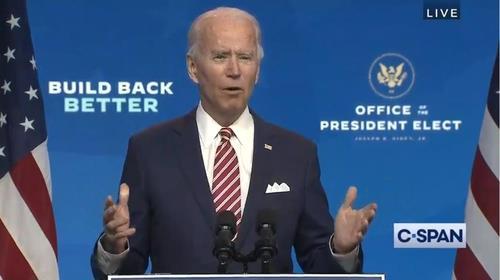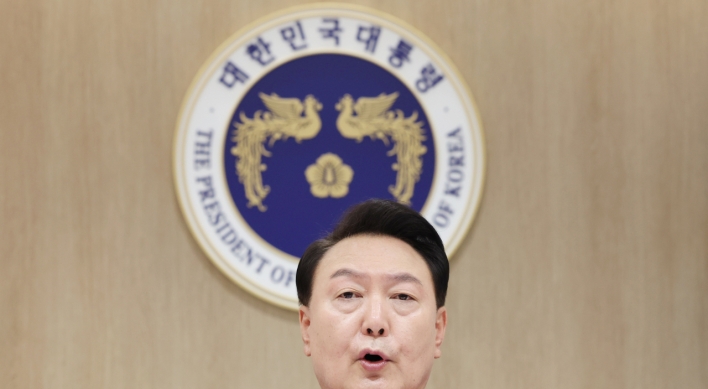Recent signing of RCEP suggests need for US reentry into TPP: CRS report
By YonhapPublished : Nov. 26, 2020 - 09:06

WASHINGTON -- The recent signing of the Regional Comprehensive Economic Partnership (RCEP) by South Korea and 14 other countries in Asia reinforces the need for the United States to sign a similar deal in the region, a report suggested Wednesday.
The report from the Congressional Research Service also suggested the US may have to consider reentering the Trans-Pacific Partnership (TPP) agreement to protect its interests in the region.
"Some Members of Congress and analysts saw TPP as an opportunity for the United States to shape regional and global trade rules, and potentially influence China's economic practices," said the report, dated Nov. 19.
The report came three days after US President-elect Joe Biden noted a need for his country to work with its allies in the region to counter China's growing competition.
"We make up 25 percent of the world's trading capacity, of the economy of the world. We need to be aligned with the other democracies, another 25 percent or more, so that we can set the rules of the road, instead of having China and others dictate outcomes because they are the only game in town," Biden said at a press conference.
The RCEP, signed Nov. 15, has all 10 member countries of the Association of Southeast Asian Nations as its members, along with South Korea, China, Japan, Australia and New Zealand. Together the 15 countries represent more than 30 percent of global trade and gross domestic product.
The US, on the other hand, withdrew from the TPP in January 2017, only a few days after President Donald Trump came into office.
The report said the RCEP, once implemented, could shift regional trade in ways that "impact US commercial activity and broader strategic interests."
"Early analyses generally conclude that RCEP could reduce US commercial activity in the region if (1) members shift trade to US competitors, and (2) supply chains reorient to capitalize on RCEP's tariff reductions and rules of origin," it said.
"Further, formation of trade rules in Asia that may not reflect US negotiating priorities, such as approaches to e-commerce or IPR (intellectual property rights), could disadvantage US competitiveness abroad," added the report.
It insisted such implications reinforce a need for the US to reengage and possibly reenter the TPP.
"Some experts view these developments as reducing US geopolitical influence and reinforcing a need to reenvision US engagement in the region, potentially through negotiating its reentry into the revised TPP-11," it said. (Yonhap)
The report from the Congressional Research Service also suggested the US may have to consider reentering the Trans-Pacific Partnership (TPP) agreement to protect its interests in the region.
"Some Members of Congress and analysts saw TPP as an opportunity for the United States to shape regional and global trade rules, and potentially influence China's economic practices," said the report, dated Nov. 19.
The report came three days after US President-elect Joe Biden noted a need for his country to work with its allies in the region to counter China's growing competition.
"We make up 25 percent of the world's trading capacity, of the economy of the world. We need to be aligned with the other democracies, another 25 percent or more, so that we can set the rules of the road, instead of having China and others dictate outcomes because they are the only game in town," Biden said at a press conference.
The RCEP, signed Nov. 15, has all 10 member countries of the Association of Southeast Asian Nations as its members, along with South Korea, China, Japan, Australia and New Zealand. Together the 15 countries represent more than 30 percent of global trade and gross domestic product.
The US, on the other hand, withdrew from the TPP in January 2017, only a few days after President Donald Trump came into office.
The report said the RCEP, once implemented, could shift regional trade in ways that "impact US commercial activity and broader strategic interests."
"Early analyses generally conclude that RCEP could reduce US commercial activity in the region if (1) members shift trade to US competitors, and (2) supply chains reorient to capitalize on RCEP's tariff reductions and rules of origin," it said.
"Further, formation of trade rules in Asia that may not reflect US negotiating priorities, such as approaches to e-commerce or IPR (intellectual property rights), could disadvantage US competitiveness abroad," added the report.
It insisted such implications reinforce a need for the US to reengage and possibly reenter the TPP.
"Some experts view these developments as reducing US geopolitical influence and reinforcing a need to reenvision US engagement in the region, potentially through negotiating its reentry into the revised TPP-11," it said. (Yonhap)











![[KH Explains] How should Korea adjust its trade defenses against Chinese EVs?](http://res.heraldm.com/phpwas/restmb_idxmake.php?idx=644&simg=/content/image/2024/04/15/20240415050562_0.jpg&u=20240415144419)







